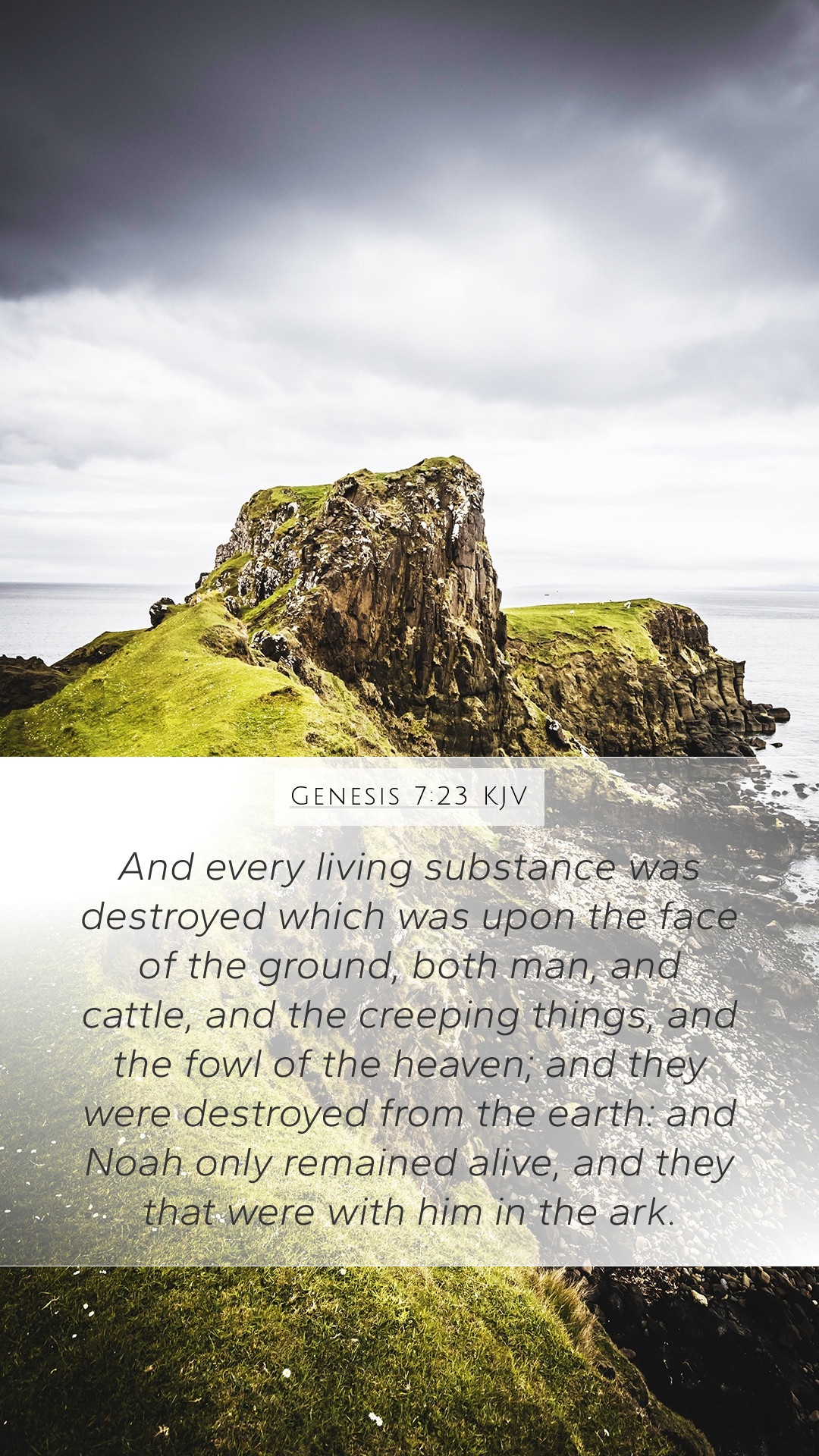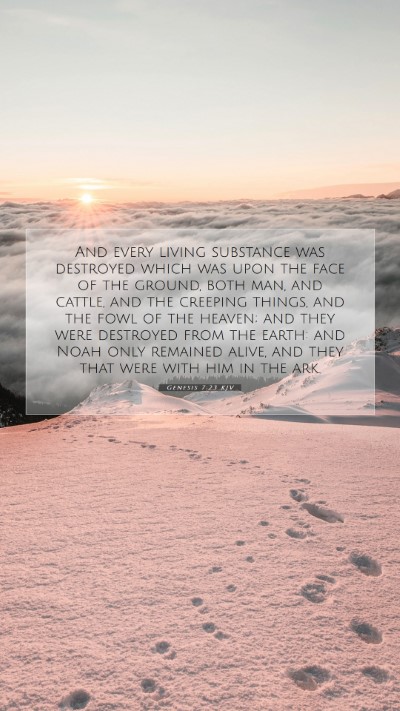Understanding Genesis 7:23
Genesis 7:23 states: "And every living substance was destroyed which was upon the face of the ground, both man, and cattle, and the creeping things, and the fowl of the heaven; and they were destroyed from the earth: and Noah only remained alive, and they that were with him in the ark."
This profound verse captures the culmination of God's judgment through the Great Flood. In a comprehensive analysis, we'll explore the meanings, interpretations, and commentaries from respected Biblical scholars such as Matthew Henry, Albert Barnes, and Adam Clarke.
Contextual Overview
Understanding this verse requires recognizing its place within the narrative of Noah's Ark. It reflects the complete devastation of the earth caused by the flood—a pivotal event that signifies God's wrath against the immense wickedness of humanity.
Exegesis and Commentary
Matthew Henry's Commentary
Matthew Henry emphasizes the following key aspects:
- God’s Judgment: Henry points out that the total destruction indicates God's severe judgment on sin. It demonstrates that divine justice does not overlook iniquity, but demands accountability.
- Preservation of the Righteous: The verse also amplifies the mercy shown to Noah and his family. While the whole earth faced judgment, Noah's faithfulness secured his survival.
- The Scope of Destruction: Henry highlights that the destruction was not limited to humans but encompassed all living creatures, illustrating the extent of divine displeasure with creation’s corruption.
Albert Barnes’ Insights
Albert Barnes provides further clarity:
- Symbolism of the Ark: Barnes views the ark as a symbol of salvation amidst judgment. He articulates that Noah's faith and obedience provide a pathway for redemption.
- Comprehensive Destruction: He notes that the mention of every living substance underscores the comprehensiveness of God’s judgment, reinforcing an important lesson about the totality of sin's consequences.
- Divine Sovereignty: Barnes asserts this verse exemplifies God's dominion over life and death, underlining that His will prevails over creation.
Adam Clarke’s Commentary
Adam Clarke brings a theological perspective:
- Historical Context: Clarke emphasizes the historical context of the flood, arguing that it serves as a vivid warning to future generations concerning the seriousness of disobedience to God.
- The Necessity of the Flood: He discusses the necessity of such drastic measures, given the pervasive corruption that had taken root on the earth.
- Covenantal Relationships: Clarke elaborates on the relationship between humanity and God, suggesting that this event further establishes God's covenantal nature, even in judgment.
Theological Implications
Theological interpretations reveal Genesis 7:23 as a microcosm of the eternal struggle between divine justice and mercy. It signifies:
- The Weight of Sin: Humanity's collective sin led to an unprecedented judgment.
- God's Mercy: Despite the destruction, Noah's survival represents hope and restoration after divine discipline.
- Foreshadowing Redemption: The flood and the ark foreshadow Christ's redemption; just as Noah was saved through the ark, believers find refuge in Christ.
Application for Believers
For modern believers, this verse inspires several key applications:
- Reflection on Sin: It calls for self-examination regarding one's relationship with sin and the importance of turning back to God.
- Faithful Obedience: Noah’s faithfulness serves as an exhortation to remain steadfast in obedience, even amid societal corruption.
- Hope in Judgment: It reminds believers that even in times of judgment, there is hope for salvation through faith.
Cross References
Understanding Genesis 7:23 can be enhanced by analyzing related passages:
- Genesis 6:5-8: God declares His intention to destroy due to mankind's wickedness.
- Matthew 24:37-39: Jesus draws a parallel between the days of Noah and His second coming.
- 2 Peter 2:5: Peter references Noah as a preacher of righteousness during the flood.
Conclusion
In summary, Genesis 7:23 is a pivotal verse that encapsulates the balance of divine justice and mercy. Through the insights provided by various Biblical commentators, believers can gain a profound understanding of its meanings and applications. As you engage with this scripture, consider its implications for your life and faith.


